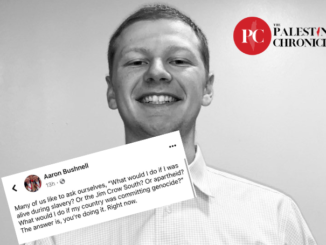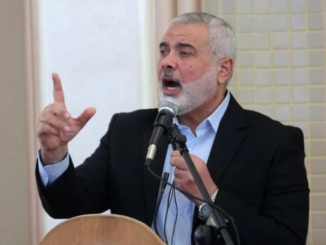
Reviewed by Yasmin Ibrahim
(Gaza: An Inquest into its Martyrdom. Norman Finkelstein. January 2018.)
Norman Finkelstein’s opening dedication of his new magnus opus encapsulates his motive: ‘To Gaza, The Truth.’ Finkelstein is a serious academic who has no patience left for those imposturous ‘truths’ about Gaza that go as far as to turn the victims into perpetrators, which he also takes great care to dismantle in his book.
Made notable in the 1980s for combing through the footnotes of Joan Peters’ ‘From Time Immemorial’ and exposing her as a fraudulent plagiarist, Finkelstein remains to this day unequalled in the scholarly community for his excruciating attention to detail; after all, the ‘evil is in the detail’, he notes in the opening pages of his book.
Self-aware of his fastidiousness, Finkelstein kindly asks the reader for their ‘infinite patience’ before embarking on a lengthy and arduous perusal of over a decade of human rights reports published after critical events in Gaza’s tragedy. The sheer density of human rights material from Israeli, Palestinian and UN sources on Gaza ‘that could by now fill a medium-sized library’, Finkelstein approximates, and which serve as the primary subject matter of his new book, is overwhelming but made accessible to the attentive reader.
Case by grievous case, Finkelstein reconstructs the harrowing man-made reality of what has befallen Gaza.
Finkelstein’s examination of the 595-page ‘Goldstone Report’ alone takes up the second of four parts of his book, each marking a critical episode in Gaza’s suffering: Operation Cast Lead, the Mavi Marmara (the flotilla raid) and Operation Protective Edge.
In 2009, respected jurist Richard Goldstone was commissioned by the UN Human Rights Council to head a mission investigating all laws breached during Operation Cast Lead (2008-2009). For all of the report’s magnitude, its conclusion is unambiguously clear: the Israeli onslaught was “a deliberately disproportionate attack designed to punish, humiliate and terrorize a civilian population […]”, for which the report goes on to detail the endless, egregious cases. By comparison, the quantity of Hamas’ crimes stood marginal beside Israel’s.
Finkelstein centers his discussion of the ‘Goldstone Report’ on the bellowing barrage of abuse it received from across the Israeli community. So hot and flustered were its critics, not because of any well-founded doubts about its veracity but the exact opposite. They couldn’t find holes to pick.
How could Israeli vocalizers of Israeli ‘hasbara’ (propaganda) ‘credibly play [their] usual cards’, Finkelstein rhetorically asks, “anti-Semite,” “self-hating Jew”, “Holocaust denier” – against Goldstone’; a self-declared life-long supporter of Zionism? Why would Goldstone turn his back on Zionism, sacrifice his credible social standing in this community and toss and turn at night anticipating the backlash, unless he felt obliged to by his commitment to the law? “The fact was,” Finkelstein assesses, “he had a choice in theory only. If Goldstone elected to defend Israel against the indefensible, he would have committed professional suicide.”
Yet Goldstone did just that: risked ‘commit[ting] professional suicide’ by recanting in April 2011 in betrayal of truth, righteousness, and his professional integrity. In the latter (arguably more crucial half) of Finkelstein’s section on the controversial judge, he emphasizes that Goldstone stood alone in his recantation.
Amnesty international, UN experts, not to mention the other three members of the Goldstone mission found no basis for his recantation and expressed mixed emotions of disappointment and frustration. Yet there was a shortage of bewilderment, which is telling of the suspected conditions under which he recanted.
The Goldstone episode marked a critical juncture in how the human rights community chose to cover Gaza, Finkelstein observes, which more or less shapes the remainder of the book.
After Goldstone, the human rights community fell shamefully silent on Gaza. Notably, where Finkelstein had read through five substantial Human Rights Watch (HRW) reports on Cast Lead in 2009, he was appalled to find that HRW only published one skeletal, fifteen-page report on Protective Edge. Fearing the repercussions of following in Goldstone’s footsteps, the human rights community held their tongues.
Now the US-based Israeli lobby was more vigilant of those who dared to commit “lawfare” against Israel, which Finkelstein defines in his book as the “outrageous notion that Israel should be held legally accountable for its crimes.”
Even so, that the human rights community proved itself to have so brittle a backbone when carrying the weight of Gaza on its shoulders is nothing short of a disgrace. Behind Finkelstein’s frustration is an almost tender tone of disappointment. He expected more from them.
Relatively, he was not as surprised at the whitewashed conclusions of two reports that were not commissioned by human rights organizations. As he discusses in part three of his book, these two reports evaluate the Israeli raid of a flotilla in May 2010, which resulted in the murder of nine of its passengers.
While these reports were far more relentless, even, in their exonerations of Israeli atrocities than the handful of reports issued by human rights organizations post-Goldstone, Finkelstein does not communicate the shock-factor. After all, what more could he have expected from a “commission” set up by the Israeli government in place of human rights organizations nosying into its crimes than a mendacious report that completely turned reality upon its head.
Published January 2011, the ‘Turkel’ report asserted that the victims on the flotilla were actually hooligan Islamist aggressors that intended to commit murder “well before the arrival of the Israeli armed forces”; so prepared, in fact, that they were equipped with high-tech glass-marbles and slingshots.
No more surprised was Finkelstein with the UN-panel report on the flotilla raid published six months after the Israeli report, whose committee was led by crooked Columbian ex-president Alvaro Uribe. Known for his desire to have closer military relations with Israel, Uribe’s report goes to such great lengths to vindicate Israel that, to give one of Finkelstein’s many examples, it casually “undid the law”; apparently Gaza was not “occupied” but its legal status “uncertain”.
Moreover, the report alleged that the blockade was not illegal because although it prevented the entry of essential foods into Gaza, Israel did not intend by this to starve the population. Besides, Gaza was only left a bit hungry.
For Israel’s makeshift “commission” or Uribe’s panel to have produced skewed reports was treacherous but not that shocking. For Amnesty International and other human rights organizations to have stooped to this level (post-Goldstone) felt to Finkelstein a ‘betrayal’.
Most scrupulous is Finkelstein in the last sections of his book in which he elucidates the repeated strategies used in Amnesty’s report of Protective Edge to exonerate Israel. Time and time again when Amnesty’s own harrowing case studies pointed incontrovertibly to the conclusion that Israel deliberately attacked civilians, the report swerved this conclusion and delivered a watered-down verdict.
So plainly and accessibly does Finkelstein lay out to the reader examples of this in the Amnesty report. For instance, when Israel fired missiles into a refugee camp and killed four family members including three children, one of which was 10-year old Youssef whose upper half was blown off, Amnesty declared this a ‘disproportionate attack’.
A ‘disproportionate’ attack against what threat? Amnesty themselves found ‘no information indicating that any of the men who were in the house were members of a Palestinian armed group.’
As Finkelstein assesses and is worth quoting at length, “‘if Amnesty “has no information” […] then it was an intentional attack on civilians and a civilian object. To invoke ex nihilo, the possibility [“even if…”] that Palestinian fighters were inside, and then, on the basis of this baseless speculation to pronounce the attack apparently “disproportionate”, is a cowardly and shameful dodge.”
The list goes on: Amnesty continues to grant Israel this caveat; ‘what if’ there was a military target. By giving Israel this benefit of the doubt, Amnesty operated outside of the law. Based on the evidence they had gathered, Amnesty should have concluded that it was beyond reasonable doubt that Israel deliberately attacked civilians in the absence of a military target.
Just because Finkelstein sharply criticizes the recent failures of the human rights community does not mean that he has given up on them. Rather, his critique is motivated by his appreciation of their vital role as sole international advocates and witnesses of Gaza’s oppression. “[Human rights reports] have generally upheld exacting standards of accuracy”, he writes in the opening pages of his book, “and they record a ghastly tale of suffering and misery, on the one hand, and criminal excess and heartlessness on the other.”
Let this transparency not be marred by cowardice, Finkelstein implores. For anyone who chooses to read ‘Gaza: An Inquest into its Martyrdom’ bears witness to the harrowing Truth and preserves it in the collective memory.
– Yasmin Ibrahim and I am a British Palestinian research graduate from King’s College London and freelance journalist. She contributed this article to PalestineChronicle.com.








I am disappointed to see this article published in the Palestine Chronicle. The damage Mr. Finkelstein inflicted on the BDS movement and the Palestinian solidarity movement in general surpasses any book he has written or might write on Palestinian human rights.
Trying to rehabilitate him is wrong. Without a clear retraction and an apology for his harmful and self-serving statements, his ostracization should continue if we really care about the Palestinian narrative.
Here is an interview with Under the Olive Tree Radio in Montreal refuting his legitimization of the Zionist state (Israel) and debunking his trumped-up accusations against BDS:
Solidarity / The ostracization of Norman Finkelstein. https://www.mixcloud.com/UnderTheOliveTree/20141211-solidarity-the-ostracization-of-norman-finkelstein/
Also check Canada Palestine Association’s position on hosting him and/or rehabilitating him:
What is Good Solidarity with Palestine and BDS?
http://www.cpavancouver.org/index.php/2016/03/22/what-is-good-solidarity-with-palestine-and-bds/